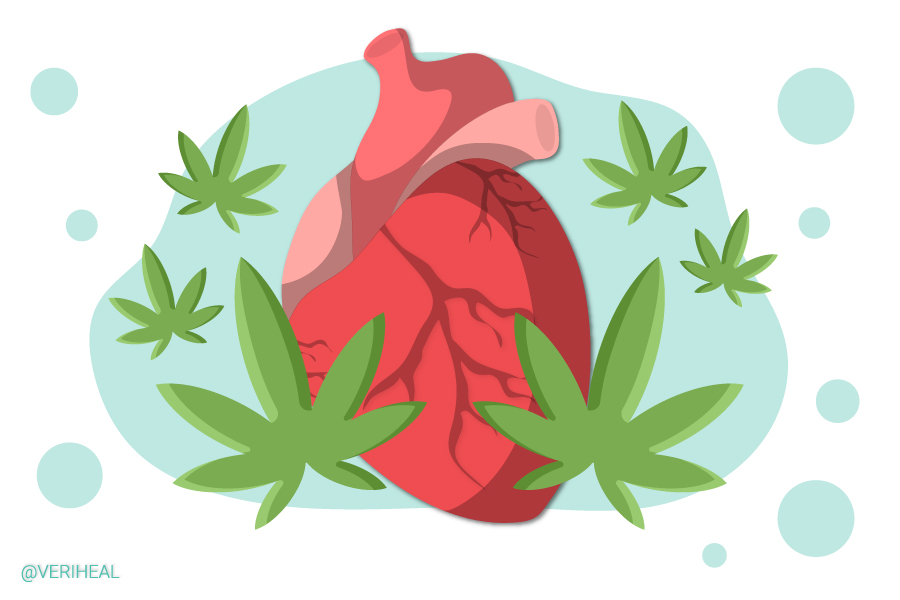Two new studies have been presented to the American Heart Association’s Scientific Sessions which, according to cannabis expert Dr. Peter Grinspoon, revealed “seemingly contradictory findings”. The findings suggested that smoking cannabis can be dangerous for those with heart disease but that it can help reduce the risk of experiencing kidney failure, for example. But what does this mean for those with heart disease and is this exclusive to just smoking cannabis or does it include other methods of consumption? Let’s find out.
Two Cannabis Studies Evaluate Risk Factors of Users vs. Non-Users
According to NBC News, two studies found complicated results in the relationship between cannabis and heart patients. One study reported that those who smoked cannabis and then underwent coronary angioplasty were more likely to experience strokes or bleeding post-angioplasty than those who did not smoke cannabis. Coronary angioplasty is a non-surgical procedure that aims to clear blocked arteries. While the second study found that those who survived a heart attack and consumed cannabis were more likely to present with a subsequent heart attack.
The lead author of the first study, Dr. Sang Gune Yoo said that, “Marijuana is becoming more accessible, and patients should be aware of the increased risk after [angioplasty]” and that “while these are risks to be aware of, they shouldn’t deter patients from obtaining this lifesaving procedure”. He went on to explain that these new findings are just another example and reason for why there needs to be more studies conducted into the effects of cannabis on the heart and other parts of the body- but if we’re being honest, the same can be said about cannabis from any perspective. However, we all recognize the need for a better understanding of all aspects of cannabis, yet there is not much that can be done about that until the American federal government removes cannabis from its’ current schedule 1 listing.
The CDC estimates that 805,000 Americans experience a heart attack each year and that the majority of those are first-time attacks. Heart disease is also the number 1 reason for death in America. In order to get a better understanding of the impact of cannabis on coronary angioplasty patients, Dr. Yoo and his team examined the data of 113,477 patients in Michigan. Of those, 3,970 self-identified as cannabis users. From there, the team matched 3,903 cannabis consumers with 3,903 non-cannabis consumers and found that those who were smoking cannabis experienced bleeding at a rate of 5.2% compared to 3.4% of non-cannabis users. Additionally, the team found that the 3,903 cannabis consumers also experienced strokes at a rate of 0.3% compared to the 0.1% of non-cannabis consumers.
Why You Should Get Your Medical Marijuana Card
Veriheal has satisfied millions of patients nationwide by giving them access to these benefits
- Larger purchase limits
- Peace of mind
- Enhanced legal protection
- Access to higher potency strains
- Save up to 25% on cannabis purchases
- Skip the line at the dispensary
Contradictory to these results that show some indication that heart disease patients should probably avoid cannabis, the study with Dr. Yoo unexpectedly found that the cannabis consumer group was also less likely to present with sudden kidney failure. The heart and kidneys are closely interrelated organs and any negative impacts to one will often put the other in danger. If cannabis poses a risk for subsequent heart attacks it would make sense, in theory, that the kidneys would be significantly jeopardized as well. But these new findings don’t suggest that which is why it’s compelling for further study.
Is the Issue Because of Consumption Method or Cannabis Compounds?
NBC stated that the second study found that, “among patients who had an artery-clearing procedure after a heart attack, those who used marijuana had a higher rate of subsequent heart attacks than those who don’t use cannabis, or 7.2% vs 4.5%” and that “heart attack risk factors- including hypertension, diabetes and high cholesterol- were significantly lower in cannabis users”. Unfortunately, the study does not answer whether the increased risks are due to the cannabis compounds or from the smoke associated with burning a plant-based substance.
Dr. Deepak Cyril D’Souza, a professor of psychiatry at the Yale University School of Medicine, explained to NBC News that his own studies on THC revealed that it can increase heart rate and may have an effect on blood pressure. He goes on to explain that the studies took place on healthy and young individuals and should the results be translated to older individuals who may have cardiovascular issues, it could prove to be the cause. This suggests that the problem for heart patients with cannabis could lay in cannabis compounds. Meanwhile, Dr. Peter Grinspoon, an instructor at Harvard Medical School and a member of the board of Doctors for Cannabis Regulation, has noted numerous incoming research reports that suggest an increase in stroke, bleeding, and second heart attacks in those using cannabis but that risk factors such as hypertension, high cholesterol, and diabetes were reduced. This also does not indicate whether the problem is with smoking cannabis or with the cannabis compounds.
In order to assure the safety of heart patients, perhaps it’s best to avoid using smoking as the main method of consuming cannabis and/or avoid higher doses of THC in the cannabis they do consume. Heart patients should also speak openly with their physicians on medicating with cannabis for its therapeutic properties.
Author, Share & Comments









